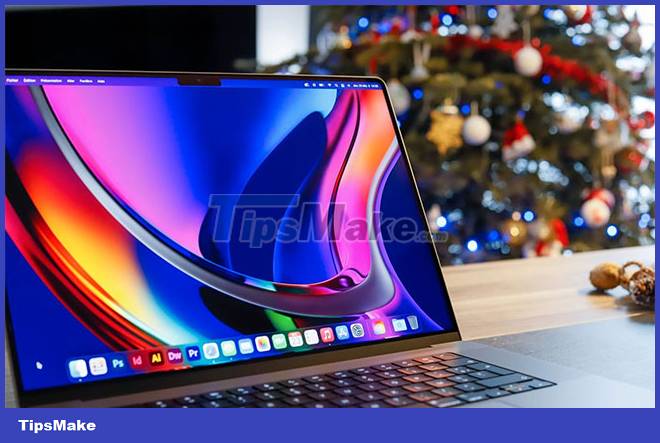Is Linux, Windows or macOS the operating system for you?
Computers have made huge strides in technology over the past few decades, evolving from bulky machines into sleek, performance-focused devices. And currently, there are three common operating systems that power most computers:
- Windows
- macOS
- Linux
In this article, TipsMake will compare these 3 types of operating systems, then look at their best use cases and features.
Windows

Microsoft Windows is the most popular desktop operating system in the world, with a market share of about 74% (according to Statista). Since its initial release in 1985, this operating system has undergone a lot of changes, and despite its ups and downs, Windows has been the market leader for a long time.

Microsoft Windows runs on computers around the world. Its popularity has grown significantly, especially due to the popularity of Windows 10 and the free upgrade to Windows 11 that the company offers.
Microsoft Windows also ships on most laptops released today. Most major manufacturers pre-install Windows and add custom software before shipping to consumers.
Ease of installation
Windows is extremely easy to set up. It also works seamlessly with most hardware, which is one of the reasons why this operating system is so popular. Alternatively, you can purchase a disc or purchase a digital copy, which allows you to create an image and install Windows on your computer.
There are different methods to install Windows 11, but most of these methods are pretty easy to do. Anyone with a little basic computer knowledge can run the setup wizard. And more importantly, Microsoft has improved performance on Windows 11, so you can even install Windows 11 on your old PC.
Price
Windows 11 is a free upgrade for users moving from Windows 10. However, if you're not upgrading from Windows 10, a new Windows 11 Home license costs $110, while Windows 11 Pro costs $150.
Software usability and performance
This is where Microsoft Windows really shines. Almost every piece of software runs seamlessly on Windows, mainly because of its install base. As a result, Windows is extremely flexible and most developers create applications or software that run natively on the platform.
Installation is extremely easy and is done through an installation wizard. You don't need to be familiar with any command line interface tools, although one is available in Windows.
If you like to play games, Windows is the best choice. That's because the company has focused on improving gaming performance. Most developers and hardware manufacturers take advantage of options like DirectX 12, which get the most out of the GPU and CPU.
You can even optimize Windows 10 for better gaming performance. Windows is ideal for people who want a customizable PC. You can easily swap out different components, install new drivers, and upgrade the parts you want.
If you want maximum control over your PC or customize and personalize it, there's hardly a better operating system than Microsoft Windows.
Backup
If you are wondering how to create backups on Windows 11, the good news is that it is extremely easy to do. Microsoft provides a built-in system utility that allows you to easily create different backups and restore them with a single click!
macOS

Apple's operating system has a relatively small installation base compared to Windows, but macOS continues to be popular. Despite being Windows' biggest competitor, macOS takes a very different approach.
For starters, unlike Windows, you can't just buy a copy and install it on any computer. It also doesn't come pre-installed with other computers; you can only get it with iMac, MacBook, Mac mini or other official Apple hardware.
It's a closed system (with many influences and open source!), but has proven its worth in its 35 years of existence. More importantly, macOS is also extremely secure, mainly due to its smaller market size.
Malware threats on macOS are minimal, although there are some signs that your Mac has been infected with a virus that you should look out for.
Ease of installation
This is extremely easy. The operating system comes pre-installed on every MacBook, as well as iMac, that the company sells, and you can run updates continuously. More importantly, updates happen regularly and are relatively easy to install.
Updates are also much less frequent than in Windows, so you don't have to worry about your Mac running updates at an inconvenient time, which is all too common with Windows. All versions of macOS are also free.
Some might argue that there are disadvantages to buying a MacBook when compared to Windows, but the truth is that despite the higher purchase cost, if you divide the total cost by the lifetime of the system, the cost is very reasonable, since you don't have to worry about upgrading much.
Software usability and performance
Apple's operating system is extremely popular because of its ease of use and its deep integration with the Apple ecosystem. In addition, most people think that it is easier to install and manage applications than Windows.
Although based on Linux, macOS allows you to install software directly from the App Store. Or, most applications allow you to download a DMG file, a disk image file. Then just drag the icon to the Applications folder to install the application!
And, when you want to delete it, just delete the file from the Applications folder. You don't have to worry about running any setup wizards. Developers and designers generally prefer macOS because of its support for creative tools.
More importantly, unlike Windows, macOS also comes with a bunch of free apps. You get the following:
- A suite of productivity tools, including a word processor, spreadsheet program, and a presentation tool.
- The Preview app is great for photo editing and also lets you edit PDFs!
- A video editing application.
- Music editing tool, GarageBand. GarageBand is easy to use and used by many creative professionals.
Backup
If you're wondering how to back up your Mac, you'll have to use a tool called Time Machine. You can set up both manual and automatic backups, and even create backups on an external drive, just like Windows.
Linux

Widely preferred by developers, Linux is an operating system known for its versatility. Unlike Windows and macOS, Linux is completely open source, so it can be modified and customized.
Since Linux is open source, there are different variations of this operating system, known as distributions. There are even lightweight distros that you can install on older PCs. In fact, Windows 11 has a lot in common with the Linux desktop!
These distributions range from software, which provides core system functionality, to custom user interfaces designed to operate specific hardware. One of the most popular distributions is Ubuntu, which is widely used for its versatility.
Ease of installation
If you want to know how to install the latest version of Ubuntu on your laptop or PC, just start by downloading the latest image from Ubuntu's website. Then you just need to load it onto the USB or create a disk image to install it.
Software usability and performance
Compared to Windows or macOS, the usability of Linux is limited. Running new software on Linux isn't always easy, as not all programs offer native support (at least you'll find most programs on Windows and macOS). This means you will have to install a compatibility layer like Wine. The installation process also varies, so make sure you carefully follow the steps to learn how to install Wine on Ubuntu.
In the past, Linux GUIs were inferior to those of Windows or macOS, options that offered better graphics and performance. However, that has now changed, with Ubuntu offering a stunning GUI that can easily rival applications like Finder and Windows Explorer.
Installing apps on Linux is a bit complicated. Ideally, you should know how to use the command line interface tool because that's what you'll be using most of the time. Unfortunately, that's what limits Linux's popularity; people consider it too technical and not useful for everyday use. Furthermore, most apps are free or open-source alternatives to popular Windows or macOS apps, which may not be as good as their proprietary, native apps.
Backup
Running backups on Linux is also not simple, as you need to know specific commands. However, there are some GUI tools that you can use, such as Déjà Dup. You can easily learn how to back up your data with Déjà Dup on Linux, although that requires running a few commands.
Which operating system is right for you?
As you can see, all 3 operating systems are great in their own right. However, it all depends on what you are familiar with and enjoy using. For example, if you prefer full control, Linux is probably the best choice. But if you want something easier to use, the macOS vs. Windows balance would be ideal.
You should read it
- ★ Run Windows applications on Linux, macOS and other platforms
- ★ Making Linux look like macOS with these easy tweaks!
- ★ Deepin Linux - Extremely interesting operating system, beautiful interface, far beyond both Windows 10 and macOS
- ★ These operating systems can be installed on Macs
- ★ How to run Chrome OS from USB